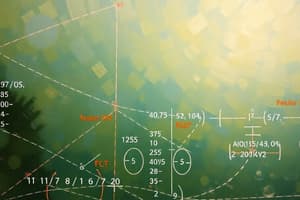Podcast
Questions and Answers
What are fundamental quantities?
What are fundamental quantities?
Fundamental quantities are physical quantities that are independent of other physical quantities.
Give an example of a derived quantity.
Give an example of a derived quantity.
Force, pressure, acceleration, volume, etc. are examples of derived quantities.
What are the three basic units in the C.G.S. system?
What are the three basic units in the C.G.S. system?
The three basic units in the C.G.S. system are centimeter, gram, and second.
What does SI stand for and what does it comprise?
What does SI stand for and what does it comprise?
What are the fundamental units of length, mass, and time in the M.K.S. system?
What are the fundamental units of length, mass, and time in the M.K.S. system?
What are the seven fundamental quantities in the SI system?
What are the seven fundamental quantities in the SI system?
What are fundamental units?
What are fundamental units?
What are derived quantities?
What are derived quantities?
What is the unit of amount of substance?
What is the unit of amount of substance?
Candela is the SI unit of which physical quantity?
Candela is the SI unit of which physical quantity?
What is a systematic error?
What is a systematic error?
Compute the unit of velocity.
Compute the unit of velocity.
Give an example of an instrumental error.
Give an example of an instrumental error.
What is a random error (chance error)?
What is a random error (chance error)?
How can random errors be reduced?
How can random errors be reduced?
What is a least count error?
What is a least count error?




